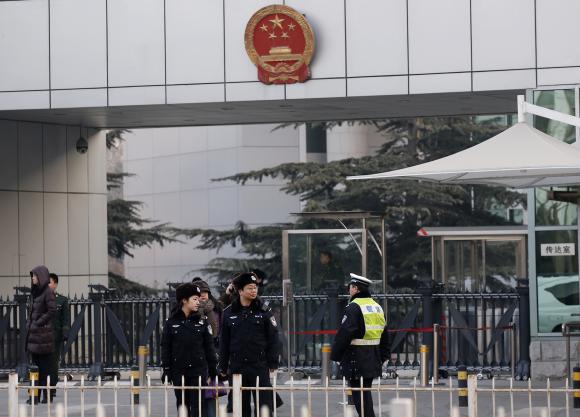A new draft law increases China’s intelligence agencies’ powers as part of Xi Jinping’s efforts to strengthen national security and fight terrorism. The new law, posted on the National People’s Congress website for public review (and translated by both China Law Translate and China Copyright and Media), allows for enhanced surveillance techniques, calls for greater cooperation among domestic security agencies, and applies to both Chinese citizens and foreigners. The draft is the latest component of what NYU legal scholar Jerome Cohen has described as “a comprehensive legislative agenda designed to confirm China as a de facto garrison state.” From AP:
The proposal states intelligence agencies could “collect and process” information on foreigners and Chinese citizens and conduct work outside the country’s borders. However, it was unclear from a publicly released draft whether operations abroad could target foreigners or must be limited to Chinese citizens.
The law also states that intelligence operatives who abuse their powers will be subject to prosecution.
The draft will have to undergo three readings by the National People’s Congress or its standing committee before becoming law.
In April, authorities in Beijing began offering cash rewards of up to 500,000 yuan ($72,500) for citizens who turn in foreign spies. The proposed law allows for rewards for “major contributions” to intelligence activities to be offered nationwide. [Source]
The draft law authorizes the country’s public and state security organs and the military to conduct intelligence activities both in China and abroad, according to a report by Nectar Gan at the South China Morning Post:
The draft law allows intelligence officials to adopt secret investigative measures such as wiretapping, electronic surveillance and clandestine filming. Intelligence officials can also enter “restricted access areas”, skip customs and border inspections and seize vehicles owned by individuals or institutions.
Spy agencies could also establish “cooperative relationships” with individuals and organisations, the draft law said.
But it also warned intelligence officials against overstepping their authority, abusing their power, or leaking state or commercial secrets, saying that these infractions would be punished by law. [Source]
Former Vice Minister of State Security Ma Jian was detained in 2015 and investigated for corruption. He is awaiting prosecution.
Reuters has more on the text of the law and its broader objectives:
“State intelligence work should…provide support to guard against and dispel state security threats (and) protect major national interests,” the document said, without giving a timeframe for passage of the law.
National interests listed in the document include state power, sovereignty, independence and territorial integrity. [Source]
The vague wording of the law is likely to raise concerns that it could be used against anyone who challenges the government position on political topics. “State power, sovereignty, independence and territorial integrity” could be applied to any public discussion of a range of sensitive topics, including Tibet, Taiwan, human rights, or the legitimacy of the ruling Communist Party. Several rights lawyers and activists rounded up in the July 2015 “Black Friday” crackdown have since been charged with “subversion of state power.” The law also stipulates that anyone suspected of “leaking state secrets” can face 15 days administrative detention without trial. The definition of “state secrets” has never been clearly defined under Chinese law, and the charge of “leaking state secrets” is frequently used against activists and journalists who publish or distribute information the government does not approve of.
In recent years, the Chinese government has published draft laws for public consultation, including the recent Foreign NGO Management Law, though it remains an open question how much such feedback influences the final legislation. Foreign businesses and rights groups submitted critiques of a draft Cybersecurity Law last year, stating that the law would further restrict online information and undermine global trade, though their concerns were not incorporated into the final text, which is set to go into effect June 1. A coalition of 54 global businesses has now called on the government to delay the law’s implementation out of fears that it will impact information security and violate China’s free trade commitments. From AP:
In a letter to Chinese regulators and the Communist Party’s cybersecurity committee, the groups said the Cybersecurity Law, due to take effect on June 1, might violate Beijing’s trade commitments and make theft of information easier. It would limit use of foreign security technology and require data about Chinese citizens to be stored in the country.
Signers included the Business Software Alliance, the US Chamber of Commerce and trade groups for insurers, technology suppliers and manufacturers from Britain, Japan, Australia, Mexico and South Korea.
Many of them were among 46 groups that made a similar appeal last year for changes to the cybersecurity law, which weren’t made.
“We are deeply concerned that current and pending security-related rules will effectively erect trade barriers,” the letter said. “China’s current course risks compromising its legitimate security objectives (and may even weaken security) while burdening industry and undermining the foundation of China’s relations with its commercial partners.” [Source]







